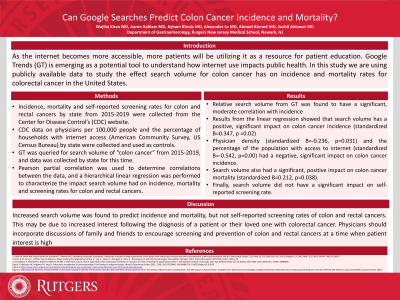Tuesday Poster Session
Category: Colorectal Cancer Prevention
P3844 - Can Google Searches Predict Colon Cancer Incidence and Mortality?
Tuesday, October 29, 2024
10:30 AM - 4:00 PM ET
Location: Exhibit Hall E

Has Audio

Wajiha Khan, MD
Rutgers New Jersey Medical School
Cartaret, NJ
Presenting Author(s)
Wajiha Khan, MD1, Aaron Kahlam, MD2, Ayham Khrais, DO2, Alexander Le, MD2, Ahmed Ahmed, MD2, Sushil Ahlawat, MD2
1Rutgers New Jersey Medical School, Cartaret, NJ; 2Rutgers New Jersey Medical School, Newark, NJ
Introduction: As the internet becomes more accessible, more patients will be utilizing it as a resource for patient education. Google Trends (GT) is emerging as a potential tool to understand how internet use impacts public health. In this study we are using publicly available data to study the effect search volume for colon cancer has on incidence and mortality rates for colorectal cancer in the United States.
Methods: Incidence, mortality and self-reported screening rates for colon and rectal cancers by state from 2015-2019 were collected from the Center for Disease Control’s (CDC) website. Additionally, CDC data on physicians per 100,000 people and the percentage of households with internet access (American Community Survey, US Census Bureau) by state were collected and used as controls. GT was queried for search volume of “colon cancer” from 2015-2019, and data was collected by state for this time. Pearson partial correlation was used to determine correlations between the data, and a hierarchical linear regression was performed to characterize the impact search volume had on incidence, mortality and screening rates for colon and rectal cancers.
Results: Relative search volume from GT was found to have a significant, moderate correlation with incidence, and a significant but weak correlation with Results from the linear regression showed that search volume has a positive, significant impact on colon cancer incidence (standardized B=0.347, p =0.02) while physician density (standardized B=-0.236, p=0.031) and the percentage of the population with access to internet (standardized B=-0.542, p=0.00) had a negative, significant impact on colon cancer incidence. Search volume also had a significant, positive impact on colon cancer mortality (standardized B=0.212, p=0.038). Finally, search volume did not have a significant impact on self-reported screening rate.
Discussion: Increased search volume was found to predict incidence and mortality, but not self-reported screening rates of colon and rectal cancers. This may be due to increased interest following the diagnosis of a patient or their loved one with colorectal cancer. Physicians should incorporate discussions of family and friends to encourage screening and prevention of colon and rectal cancers at a time when patient interest is high.
Disclosures:
Wajiha Khan, MD1, Aaron Kahlam, MD2, Ayham Khrais, DO2, Alexander Le, MD2, Ahmed Ahmed, MD2, Sushil Ahlawat, MD2. P3844 - Can Google Searches Predict Colon Cancer Incidence and Mortality?, ACG 2024 Annual Scientific Meeting Abstracts. Philadelphia, PA: American College of Gastroenterology.
1Rutgers New Jersey Medical School, Cartaret, NJ; 2Rutgers New Jersey Medical School, Newark, NJ
Introduction: As the internet becomes more accessible, more patients will be utilizing it as a resource for patient education. Google Trends (GT) is emerging as a potential tool to understand how internet use impacts public health. In this study we are using publicly available data to study the effect search volume for colon cancer has on incidence and mortality rates for colorectal cancer in the United States.
Methods: Incidence, mortality and self-reported screening rates for colon and rectal cancers by state from 2015-2019 were collected from the Center for Disease Control’s (CDC) website. Additionally, CDC data on physicians per 100,000 people and the percentage of households with internet access (American Community Survey, US Census Bureau) by state were collected and used as controls. GT was queried for search volume of “colon cancer” from 2015-2019, and data was collected by state for this time. Pearson partial correlation was used to determine correlations between the data, and a hierarchical linear regression was performed to characterize the impact search volume had on incidence, mortality and screening rates for colon and rectal cancers.
Results: Relative search volume from GT was found to have a significant, moderate correlation with incidence, and a significant but weak correlation with Results from the linear regression showed that search volume has a positive, significant impact on colon cancer incidence (standardized B=0.347, p =0.02) while physician density (standardized B=-0.236, p=0.031) and the percentage of the population with access to internet (standardized B=-0.542, p=0.00) had a negative, significant impact on colon cancer incidence. Search volume also had a significant, positive impact on colon cancer mortality (standardized B=0.212, p=0.038). Finally, search volume did not have a significant impact on self-reported screening rate.
Discussion: Increased search volume was found to predict incidence and mortality, but not self-reported screening rates of colon and rectal cancers. This may be due to increased interest following the diagnosis of a patient or their loved one with colorectal cancer. Physicians should incorporate discussions of family and friends to encourage screening and prevention of colon and rectal cancers at a time when patient interest is high.
Disclosures:
Wajiha Khan indicated no relevant financial relationships.
Aaron Kahlam indicated no relevant financial relationships.
Ayham Khrais indicated no relevant financial relationships.
Alexander Le indicated no relevant financial relationships.
Ahmed Ahmed indicated no relevant financial relationships.
Sushil Ahlawat indicated no relevant financial relationships.
Wajiha Khan, MD1, Aaron Kahlam, MD2, Ayham Khrais, DO2, Alexander Le, MD2, Ahmed Ahmed, MD2, Sushil Ahlawat, MD2. P3844 - Can Google Searches Predict Colon Cancer Incidence and Mortality?, ACG 2024 Annual Scientific Meeting Abstracts. Philadelphia, PA: American College of Gastroenterology.
